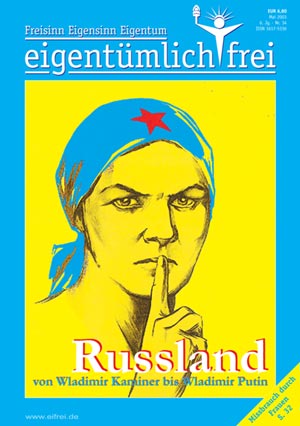
"Was genau war russisch an Ayn Rand?"
(What was especially Russian about Ayn Rand?)
Published in eigentmlich frei 34 (Mai 2003): 22-24.
By Chris Matthew Sciabarra
In this special issue on Russia of the German libertarian publication, eigentmlich frei, Sciabarra answers the question: "What was especially Russian about Ayn Rand?" Sciabarra presents the essence of his historical thesis from Ayn Rand: The Russian Radical: Ayn Rand rejected the Marxist and religious content of Russian thought, while accepting the dialectical form of its revolt against dualism. This dialectical emphasis on context-keeping had a major impact on every aspect of her corpus: her literary art, the philosophical system she called "Objectivism," and the radical social critique that she forged.
In the sweeping character of her generalizations, and in her commitment to the practical realization of her ideals, Rand was fully within the Russian Silver Age literary and philosophic tradition. Like most of Russia's great literary figures, she was an artist, social critic, and non-academic philosopher who constructed a broad synthesis in her battle against the traditional antinomies in Western thought. Like most of Russia's indigenous philosophers, she presented an exhaustive, all-encompassing theoretical totality. And like Russia's radicals, she sought to uproot contemporary power relations in all their social and institutional manifestations. Seeking to overturn the welfare-warfare state that she called the "new fascism," Rand traced reciprocally reinforcing relationships of power across psychology, ethics, culture, education, ideology, sex, race, politics and economics---and advocated an integrated revolution in all these spheres.
The article goes on to discuss the crucial impact of Friedrich Nietzsche on the Russian Silver Age---on Symbolist poets, on Marxist revolutionaries, on religious idealists, and on Ayn Rand herself. Sciabarra concludes that Rand was not merely a Russian Radical; she was also a supremely American one. For in her work, there is the notion of a genuine human and humane community, one that is neither mystical nor statist, but founded on the moral autonomy of the individual and the virtue of voluntary, uncoerced trading of value for value---the animating principles of the American way of life.
 |
 |